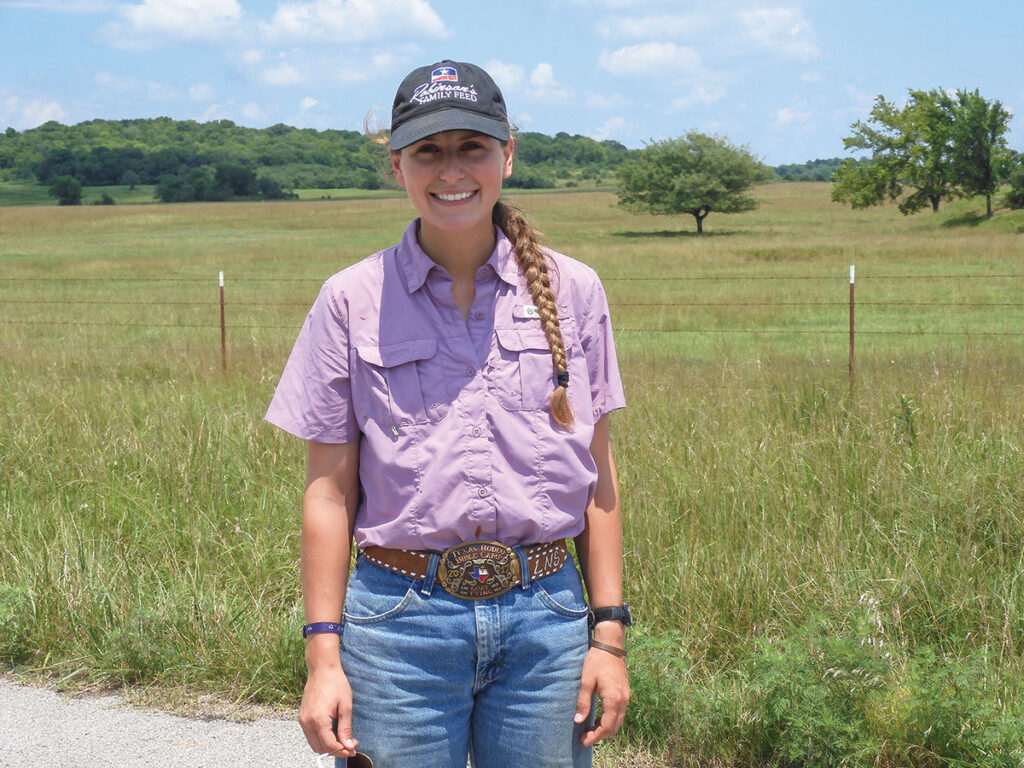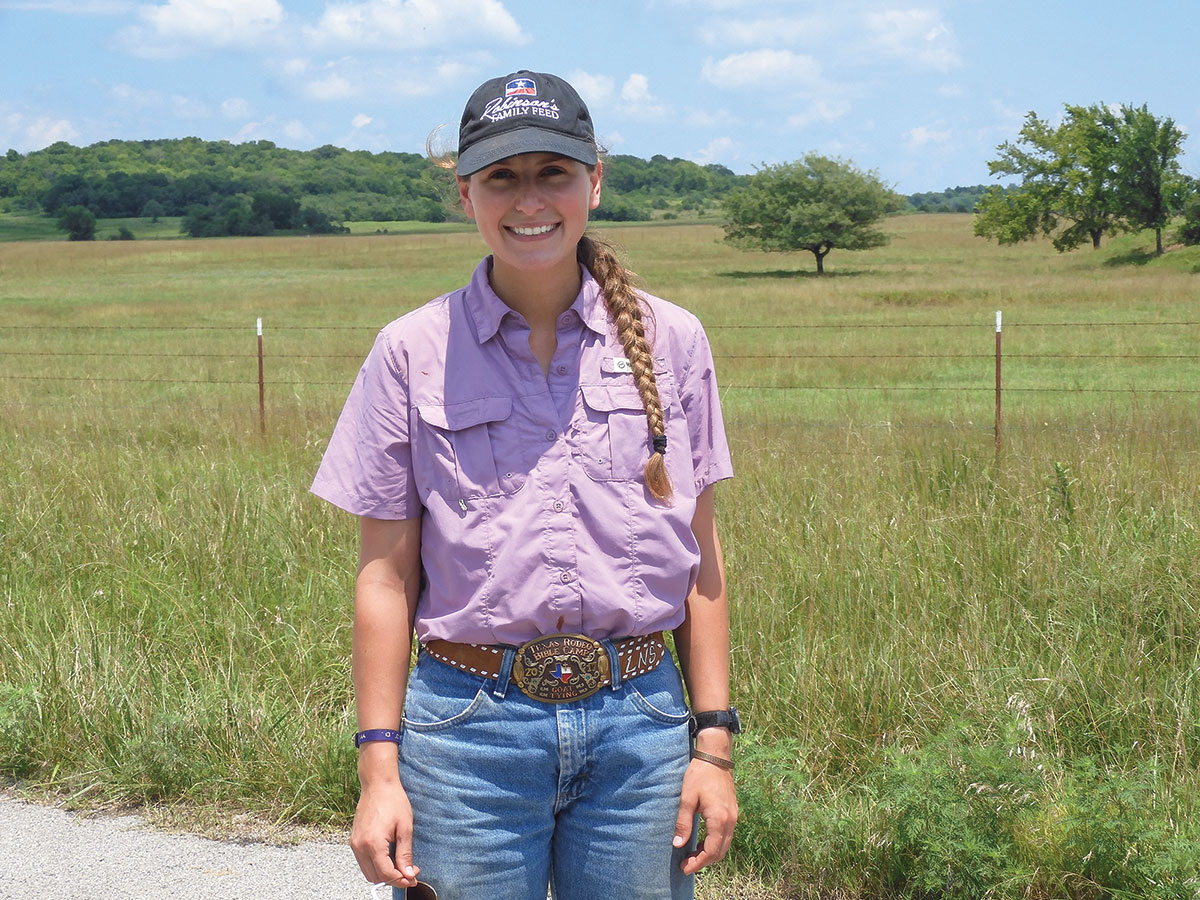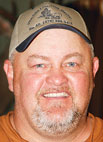
Leslie Smith discovered early in life that farming and ranching are her calling
CLAREMORE, OKLA. – Leslie Smith was raised in Mutual, Okla., on a predominantly cow/calf and grass hay operation. When she was just 5 years old her mother Gina, and grandparents, Darrell and Jeanetta Webb, took her to a nearby ranch to ride a little paint pony named “Buns of Steel” or Bunny for short. After about an hour and a half of riding, Leslie she cried all the way home , begging her family to purchase the horse.
“It was about a week later when I walked outside to the best surprise” Leslie said. “Bunny not only became my childhood best friend, but also set me on a lifelong path of loving horses.”
Young Leslie had one problem, however. While she absolutely loved being outside, she was terrified of their Angus cattle. Then one afternoon when sorting cattle, her grandmother faked a heart attack.
“I was 7 years old and watching the action from outside the corals,” Leslie recalled. “All of the sudden, my grandma, who was surrounded by cattle, doubles over and starts screaming for me to come and help her. As soon as I got to her, she stood up and said, ‘I told you cattle aren’t so bad.’ The fear was gone.”
Being the fourth generation to grow up on the family farming and ranching operation, she knew early on this was the lifestyle she wanted to live. From sorting and working cattle to baling hay, and always having a good horse to ride, Leslie stayed very busy.
“Growing up on a ranch you learn that there is no possible way to ever get everything done,” Leslie explained. “If you aren’t do something, you’re probably doing something wrong.”
While being able to drive a feed truck and tractor by age 9 and starting each and every day around 5 a.m. to feed isn’t the typical lifestyle for most young people, Leslie considers the lifestyle she grew up in as a blessing, wouldn’t have wanted it any other way.
Leslie joined her local county 4-H club at the age of 9 and begged to show. Gina then purchased Leslie’s very first show goat, Chocolate Chip. Leslie won the reserve champion doe at her first county fair and even took home the junior showmanship title.
“I was having the absolute time of my life,” Leslie said. “When announcing me as the showmanship champion, the judge referred to me as the only girl in the entire ring who knew how to smile. I think that and a bit of luck is what did it for me.”
High school brought membership in FFA and participation on her school’s livestock judging team, with ag teacher Chip Laubach serving as adviser. Though Leslie never showed cattle, she did show goats and sheep, and was heavily involved in various rodeo associations, with goat tying as her main event.
When Leslie was 9, her grandfather was injured in a farming accident while chopping down a tree for firewood. That incident forced the family to downsize their operation by selling some of the land and cattle. By the time Leslie reached high school, she was pretty much in charge. Her grandparents had aged and her mom worked as a phlebotomist at the local hospital, working variety of hours. Leslie stepped up and accepted responsibility to help the family maintain their cattle operation with Gina helping out whenever she could, usually on weekends.
Now when cattle are worked, the whole family participates, along with a couple of generous friends. Leslie helps run the animals through the chute and sort. She also participates in ear tagging and branding, in addition to helping with vaccinations and castration. She also has recently purchased 10 first-calf heifers. While the number is few, she hopes to use the heifers as a foundation for her own herd.
“I was having the absolute time of my life. When announcing me as the showmanship champion, the judge referred to me as the only girl in the entire ring who knew how to smile. i think that and a bit of luck is what did it for me.”
— Leslie smith
Going to college and pursuing an agricultural degree was a given. Leslie currently attends Oklahoma State University in Stillwater, and is a double major in agribusiness with an option in farm and ranch management, and animal science with an option in production. She is also working towards a minor in agricultural real estate appraisal and a certification in equine enterprise management. Aside from academics, Leslie is an active member and officer in the Tri Delta sorority, in addition to competing on the OSU Horse Judging Team and being involved in various other clubs and organizations, such as collegiate cattle and horse associations. Leslie also helps operate the family ranch, with her mother doing most of the daily care, with Leslie returning home frequently to help out in person.
Leslie is already using her college education by altering some of the family farming and ranching management practices. One important improvement skill Leslie has implemented since going to college, is the use of synchronization protocols in their cows and especially first-calf heifers, which aides in shorting up calving periods. Following breeding and calving season, calves are weaned at 7 to 8 months of age or around 500 to 600 pounds. Leslie’s family utilizes an abrupt weaning system where as soon as they’re separated they’re hauled to the local sale barn to be sold. Processing is done prior to weaning at around 3 to 4 months of age.
Leslie has also increased her nutritional knowledge at OSU, which she has used to begin sending off quarterly nutrient samples for testing of both their pasture and hay grounds.
“As the seasons change, so does the quality and nutrient value of your feed. It is important to know exactly what that change is, to make sure you’re meeting all of your herd’s nutrient requirements during all critical phases and accomplishing that for the least amount of money possible,” Leslie explained. The results are mainly beneficial in dictating deficiencies. While outside management practices are important, Leslie has also upgraded their record keeping system using Excel.
“You have to know the history of all parts of the operation in order to run something at its maximum potential. Whether it has to do with the land, nutrition, or overall animal health,” Leslie said. “What I do now is far more detailed and therefore helpful in making future impacting decisions.”
An internship is not required for her degree, but Leslie wanted to land one where both cattle and horses were raised, as well as used together as one entity. After visiting with her horse judging coach, Dr. Steven Cooper, he immediately recommended the A Bar Ranch in Claremore, Okla.
She turned in her application the next day and was called in for an interview later that week. After around a week of anticipation, she finally received a call offering her the position upon her acceptance. The experience has met her expectations more than she ever could have realized. She has enjoyed getting to work on and be a part of a successful cattle and horse operation like the A Bar Ranch. An unexpected bonus was arriving on the day of the ranch’s May cattle sale, where she saw firsthand how their sale program worked and was able to talk to buyers while watching the live sale and prices.
The ranch is large with properties spread over a wide area. Most of her work is completed at the Headquarters location where both a portion of the ranches cattle and horses are kept. She believes another important lesson is getting to witness various situations that involve “quick thinking and fast hands.”
“There are some things your average producer may never see or experience that is fairly typical for a larger operation. The more stock involved, the greater chance to see more things” Leslie said.
“Most of the time we start our days around 7:30 in the morning, except during branding when we would sometimes start as early as 4:30 in order to beat the heat. We work until the duties of the day are complete, which is sometimes as early as 5 p.m., and sometimes after dark.” Leslie said. Various activities Leslie was involved include: gathering and sorting cattle horseback, shipping and receiving cattle, daily care and maintenance of both cattle and horses, foaling out mares, training yearling colts, daily ranch maintenance and putting up hay.
Leslie gained multiple new experiences, such as dragging calves for the first time, tips on improving her roping skills and the proper way to gather a band of mares. While she expected to learn new ways of doing things she has done her entire life, she said she truly valued her time at the ranch and is grateful for all she learned, some of which she plans to incorporate into her family’s operation, such as their vaccination protocol, Leslie explained.
Leslie’s ultimate goal is to return back to her family’s homestead to expand and fully manage the family operation. Upon her graduation at Oklahoma State, Leslie is considering pursuing a master’s of science degree in animal nutrition with hopes to land a career as an animal nutritionist or in the field of extension.
The little girl who loved horses and was scared of cattle is developing into an agriculture advocate. She believes in keeping up to date with advances that directly apply to their ranch and especially keeping an eye on legislative changes in order to meet production expectations.
“I may not know where or what I will be in the next few years, but I know where I will end up,” Leslie asserted.







